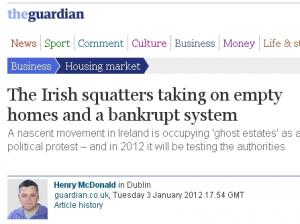



A story in the Guardian newspaper shows that politically-motivated squatters are not necessarily deterred by whether or not squatting is a crime. Squatters in the Republic of Ireland, associated with the Occupy movement, are challenging the waste of empty housing linked to the failings of the banks. In Ireland a massive speculative building programme during the "Cetlic Tiger" period has left a legacy of hundreds of so-called "ghost estates", while the tab for the bailing-out of the banks who fuelled the building binge is picked up the broader community in the form of job losses, higher taxes and cuts of all sorts (and leaving the empty homes in public hands).
The Guardian reports:
Mac an Bháird concedes that his group are breaking the law but argues that they are making an important political point. "There are thousands homeless in this country with about 2,000 on the streets of Dublin alone tonight. Yet across the city there are thousands of flats, apartments, homes lying empty – some could be fit for human habitation."
The situation in Ireland is of course very different from that in UK, where "ghost estates" are few and far between and as likely to be the legacy of failed regeneration schemes following the government's withdrawal of funding as the result of speculative housing development. Nevertheless, as the housing difficulties experienced by a significant minority of the population continue to worsen, and the contrast with the comforts of the well-off become more unpalatable, we are likely to see an increasingly politicised response. The government's moves to criminalise squatting may only succeed in heightening the tensions. In a globalised world, economic problems are contagious: so too are radical ideas.
